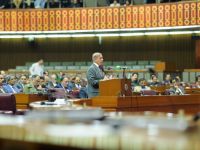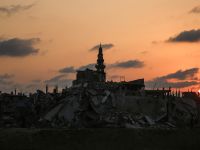By Justin Keay
LONDON (WNL) -- It's been almost a month since the largely peaceful ouster of Slobodan Milosevic and his replacement by the victor of the September Yugoslav presidential elections, Vojislav Kostunica. President Kostunica has been busy trying to consolidate power, hold the peace within the often-rancorous multi-party coalition that supported him and bolster his legitimacy through a series of international trips, including a visit to Moscow which was initially balked at switching its support from Milosevic.
It seems clear that Kostunica's low-key peaceful takeover of power from the Socialists is moving forward, albeit slowly and with strong resistance from Milosevic's Socialist Party. The most recent problem has been over the refusal of Serbian State security chief Rade Markovic, a Milosevic appointee, to step down from his post. The situation provoked the resignation of two leading reformists, Nebojsa Covic, a deputy premier from the Democratic Opposition of Serbia, and Spasoje Krunic, from the Serbian Renewal Movement. It also fuelled complaints that Kostunica lacks the necessary ruthlessness to get rid of the remnants of Milosevic's rule and is too wedded to constitutional niceties in his efforts to break with the Milosevic era. However, most observers believe the process of democratization is moving forward successfully.
"I feel the prospects are extremely good," says Dr. Susan Woodward, senior research fellow at the Center for Defense Studies, King's College London. She argues that opponents of Milosevic had been on stand-by for the day he would be overthrown and had been drawing up plans for the country's democratic renewal. She also maintains that the country's transformation will be aided by the persona of Kostunica. "He is simultaneously a westerner in his values and a Serb mindful of national traditions. This combination is very significant," she maintains.
However, big questions now face the new government, which is currently operating only on an interim basis. It is preparing the country for new parliamentary elections on Dec. 23, which should consolidate its position, but before then must tackle some vital issues. Failure to do so could undermine support for Kostunica and by extension, threaten efforts to break with the legacy of Milosevic's rule.
Over the past few months, even before Milosevic's ouster, a group of leading Serb academics, economists, journalists and legal experts have been gathering to discuss priorities in the post-Milosevic era. The New Serbia Forum published its "Program for the Reconstruction of Yugoslavia" in October 2000, just days before Kostunica won the presidency (further information about the program can be found at www.NewSerbiaForum.org.
"The idea was to help the Serb opposition prepare for government by focusing on what happened elsewhere in east Europe and drawing on these lessons for Serbia's future," says John Birch, head of the British Association for Central and Eastern Europe, a sponsor of the forum. What the Forum has done is help Serbs and western countries focus on the sheer scale of what needs to be done to modernize Serbia.
Not surprisingly, it concludes that the most important task is clearly the economy. The international community has responded quickly: In late October the European Union agreed to send Belgrade an unconditional Euro 200 million worth of humanitarian aid, while the U.S. also agreed to send aid, with the condition that war criminals must be prosecuted. However, this is just a fraction of what is needed. Serbia's economy has been devastated through gross mismanagement, corruption and criminality, natural obsolescence and an almost total lack of large-scale investment; NATO's bombing of key infrastructure and industrial sites during the Kosovo war was almost incidental.
Serbia in the year 2000 has all the negative attributes of an unreformed Socialist economy, with all the negative attributes of a semi-reformed transitional one. There are no accurate estimates of Serbian GDP but some observers -- among them James Pettifer, currently at the Institute of Balkan Studies in Salonika, Greece -- suggest that with average monthly wages of less than $80, in per capita terms Serbia is now poorer than its arch-enemy Albania. To get things moving again, the new government will have to rein in the country's huge fiscal deficit, probably restructure the country's estimated $20 billion foreign debt (which is one and a half times Serbia's GDP), introduce monetary reforms, start privatization, encourage investment, and restructure the banking industry.
At the same time Kostunica and his government will have to make very significant changes to the country's body politic: His background as a constitutional lawyer should come in particularly useful for this task. "The real challenge is to create a real state and reintroduce the rule of law," says Susan Woodward. This means taking on the estimated 100 criminal gangs that currently operate outside the law with virtual impunity and tackling endemic corruption, which has become a way of life over the last 10 years. Large-scale reorganization of key institutions -- such as the judiciary and the military -- and of important professions, such as journalism, is also key to this process. However Kostunica must also tackle the highly complex and politicized issue of Serbia's relations with Montenegro, its partner in the Yugoslav federation.
Montenegro's leader Milo Djukanovic relations with Kostunica are cool on a personal as well as a political level; Montenegro refused to participate in the elections which brought Kostunica to power on the basis that they were being held unconstitutionally. Inclining towards independence for his small republic (Montenegro has about 650,000 inhabitants against 8 million in Serbia), and toying with calling a referendum on the issue, he can be expected to drag his heels over Kostunica's calls for a redefined constitutional arrangement with Belgrade.
"Djukanovic has been rather caught on the back foot by these elections," says Elizabeth Roberts, a specialist on the Balkans at University College, Dublin. She admits that as prime minister of his own country, he is unlikely to want to return to the status quo before early 1998, when Montenegro essentially played second fiddle to Serbia in the Yugoslav federation."
She argues there are three options for Belgrade and Podgorica. First, a modified federation, possibly called Serbia-Montenegro: this is favored by Kostunica and the international community, who would also hope to find a way of eventually incorporating Kosovo into it. Second, total separation, with the two states having no more than the usual ties that exist between neighboring states. And lastly loose association. Serbia and Montenegro would seek recognition as separate states, have separate seats in the UN but seek agreement on issues including defence (albeit with separate military commands in Belgrade and Podgorica), foreign affairs, currency (with Podgorica insisting in convertibility) and, of course, the free movement of goods and people.
Negotiations between Kostunica and Djukanovic are expected to take months but the latter is viewed as holding the best cards, as a majority of Montenegrins favor independence: A recent poll had 48 percent in favor, 39 percent against. There is little doubt of Djukanovic's own inclinations. In a TV interview on Oct. 31, he declared that Serbia and Montenegro have a "historical right" to independence and "have functioned as independent states for several years. The federation of Yugoslavia no longer exists...this is fact."
Perhaps the most contentious issue facing President Kostunica is the most intangible: Facing up to the key role that the Serb people played in the bloody disintegration of Yugoslavia over the past 10 years. Much has been made of the fact that Kostunica is a nationalist who initially at least supported Milosevic's actions in Kosovo and elsewhere. However, he appears to recognize that excesses did happen and, mindful of the need to maintain international support for his efforts to rebuild Serbia, he seems prepared to face up to them.
How to do this is quite another matter, as he demonstrated with his remarkable volte-face over an interview he gave to America's CBS News in late October when
he appeared to accept his "share of the blame" for the events of the 1990s. His subsequent claim that the comments were taken out of context suggests he feels Serbia -- and most importantly, its military -- is not yet ready to accept guilt. Clearly, the process of coming to terms with the past will take years if not decades, as it did in Germany after World War II. In the meantime, Serbs, and President Kostunica, will argue that Serbia has more immediate and material problems with which to contend.
© 2000 Al Bawaba (www.albawaba.com)







